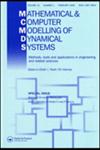Trajectory-tracking of 6-RSS Stewart-Gough manipulator by feedback-linearization control using a novel inverse dynamic model based on the force distribution algorithm
IF 1.8
4区 数学
Q3 COMPUTER SCIENCE, INTERDISCIPLINARY APPLICATIONS
Mathematical and Computer Modelling of Dynamical Systems
Pub Date : 2020-05-03
DOI:10.1080/13873954.2020.1754861
引用次数: 3
Abstract
ABSTRACT 6-RSS Stewart-Gough parallel manipulator contains six crank-rod limbs connecting the base and moving platforms to each other, forming a 6DOF manipulator. In this paper, we introduce a novel decoupled inverse dynamic model for this manipulator based on the Force Distribution Algorithm. The performance of the proposed model was evaluated in tracking a complex trajectory (of multiple segments with simultaneous translational and rotational motions) using feedback-linearization control in the joint space and compared with that of the Lagrangian inverse dynamic model. Results showed that this model leads to a better performance in feedback-linearization control, especially when the reference trajectory is quantized, and with less calculation burden in comparison with the Lagrangian model. The control system employing both models showed robustness against payload uncertainty on the moving platform (150% of the moving platform’s mass). The performance assessment and the robustness approval were performed in simulation using a Simscape model specifically built for this purpose in the Simulink environment.基于力分布算法的新型逆动力学模型反馈线性化控制6-RSS Stewart Gough机械手轨迹跟踪
6-RSS Stewart-Gough并联机械臂包含6个曲柄杆分支,将基座和运动平台相互连接,形成一个6自由度的机械臂。本文提出了一种基于力分布算法的机械臂解耦逆动力学模型。利用反馈线性化控制在关节空间中跟踪复杂轨迹(多段同时进行平移和旋转运动)的性能,并与拉格朗日逆动力学模型进行了比较。结果表明,与拉格朗日模型相比,该模型具有更好的反馈线性化控制性能,特别是在参考轨迹量化时,计算量更少。采用两种模型的控制系统对运动平台载荷不确定性(运动平台质量的150%)具有鲁棒性。性能评估和鲁棒性批准是在Simulink环境中使用专门为此目的构建的Simscape模型进行仿真的。
本文章由计算机程序翻译,如有差异,请以英文原文为准。
求助全文
约1分钟内获得全文
求助全文
来源期刊
CiteScore
3.80
自引率
5.30%
发文量
7
审稿时长
>12 weeks
期刊介绍:
Mathematical and Computer Modelling of Dynamical Systems (MCMDS) publishes high quality international research that presents new ideas and approaches in the derivation, simplification, and validation of models and sub-models of relevance to complex (real-world) dynamical systems.
The journal brings together engineers and scientists working in different areas of application and/or theory where researchers can learn about recent developments across engineering, environmental systems, and biotechnology amongst other fields. As MCMDS covers a wide range of application areas, papers aim to be accessible to readers who are not necessarily experts in the specific area of application.
MCMDS welcomes original articles on a range of topics including:
-methods of modelling and simulation-
automation of modelling-
qualitative and modular modelling-
data-based and learning-based modelling-
uncertainties and the effects of modelling errors on system performance-
application of modelling to complex real-world systems.

 求助内容:
求助内容: 应助结果提醒方式:
应助结果提醒方式:


